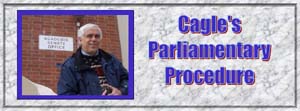
Link to Cagle's Questions page and index.
Link to Cagle's Parliamentary Procedure page.
Here are a few brief comments on the bylaws. To get a thorough evaluation, you should consult a parliamentarian or a lawyer in your area.
Article II.
You should specify the authority of the board and the source of that authority. Is it an official country agency? To whom is it responsible and to whom does it report? These matters are not clear in the present statement. Especially in a litigious society, a board that hires personnel needs to have its authority and lines of responsibility drawn out crystal clear.
Article III.
Membership seems OK. As stated, all are members with the right to vote, including the chair.
Article VIII.
Amendment of bylaws should require a 2/3 vote.
Also, relative to the origin of the authority of the board, usually the body which creates the board retains authority to change the bylaws. If agreed to by that authority in creating the bylaws, however, this provision would be appropriate.
Bylaws need not be overly complex. If these as written meet the needs of your group, then they should be OK.
The bylaws of the agency would take precedence over Robert's Rules of Order Newly Revised. State and federal laws prevail over the bylaws.
1. The by-laws state that normally, a vote carries with a majority of those present provided that there is a quorum. However, for this particular vote -- one of the most important that the Board has to make -- a vote can only carry with a majority of the full board -- not the majority of the quorum.
Bylaws often contain such provisions.
The question is, can those board members who are absent submit their vote in advance in writing? The by-laws do not mention this. Does RRR address this?
Simple answer is no. Proxy voting is prohibited under Robert's Rules of Order Newly Revised (p. 421) unless the bylaws specifically provide for it (or some higher law requires it--which generally is not the case, but could be for a state agency or board.)
The board could pass a motion to have a mail ballot, which would enable those absent to cast a vote on an important question. This method is not a form of proxy voting, but a ballot procedure often used.
2. The chair of the board is under the impression that the chairperson votes only in the case of a tie. The by-laws do not address this. Your web page suggests that this is not true. Where and how is this specified?
See Robert's Rules of Order Newly Revised, p. 476 ff, for special rules governing boards. In particular, "The chairman can speak in discussion without rising or leaving the chair; and, subject to rule or custom within the particular board . . . he can usually make motions and usually votes on all questions." The rules for boards and committees concerning the chair are different from the rules for plenary bodies or assemblies. However, because they are different doesn't mean people understand that they are different and know the "proper" rules. There is a widespread and popular belief (albeit incorrect) that no chairman ever votes, whereas in fact a chair has a right to vote and to even debate in a board. Note the wise advise from the authorities who wrote the Newly Revised version of Robert's, "subject to rule or custom within the particular board." If the chairman of a board has never voted and people believe he/she ought not to vote, then it is probably better to follow custom. My advice on this is generally for the chair to discuss this matter with the board in advance and at the beginning of his/her chairship so that everyone will have the same understanding of the "rules" in an "issue-free" environment. When controversy has stirred emotions, people get mad when the chairman says, "Well, take this and like it."
Why does the Chair of the House of Representatives not vote unless there is a tie?
Because the House of Representatives does not follow Robert's Rules of Order Newly Revised; it has its own rules. Beyond that, there is a general parliamentary practice using that as an informal rule: Although the chair can vote (actually, even in an assembly), it "preserves the impartiality of the chair" if the chair only votes which his/her vote would actually affect the outcome--that is, when the vote would have the effect of passing a motion or (when voting to create a tie) to defeat a motion. Each time the chair votes, it is sort of saying "Look which side I'm on." In any event, that practice is the custom in many groups, and occasionally built into law as part of the bylaws.
My goal is to have this person vote because, with other members absent, it will be very difficult to get a majority of the Board to vote together on anything and we need all the votes we can get. Suggestions?
Your rationale seems sensible to me. The clarification about the chair's voting prerogatives should be made as a general clarification and basis for everyone understanding what the chair's role is on the board. It is inadvisable to in any way tie this to a political rationale of getting enough votes on any specific issue.
Thanks for being out there
Nancy
You're quite welcome. I hope my comments are helpful to you.
Return to Cagle's Questions page and index.
Link to Cagle's Parliamentary Procedure page.